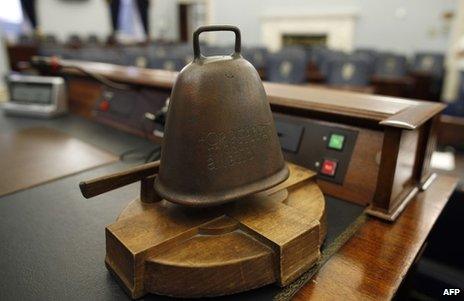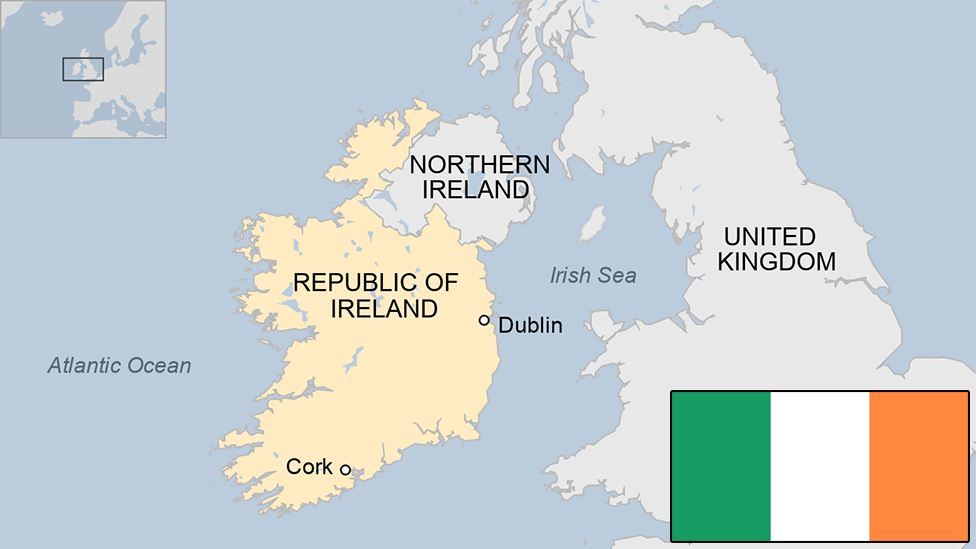Pressure to abolish Ireland's senate in referendum
- Published

Will the Irish ring time on their upper house?
The Republic of Ireland may vote this week to abolish its upper house of parliament, the Seanad. It is a move favoured by most political parties and opinion polls suggest the public mainly support abolition too, but are the Irish people fed up with their senators - or with the political class as a whole?
No respectable pollster would accept a survey of voting intentions conducted solely at Listowel racecourse in County Kerry. As an indication of what is likely to happen in Friday's referendum, it lacks scientific rigour.
But what is striking is the unvarying nature of the opinions punters offer about the Seanad. Time and again - whatever their age or gender or party allegiance - they say they have no idea what the Seanad exists to do. At times the tone is bitterly hostile.
National opinion polls also suggest a majority in favour of getting rid of Ireland's 60-seat upper house.
'Rest home'
In Listowel, a quartet of female race-goers sip coffee and watch keenly as the first horses of the day parade around the paddock. It is obvious a very Irish love of horses and the turf is part of their lives.
Without exception they query what role the Seanad has in modern Irish society, especially after several years of painful economic struggle.
The four share much the same list of complaints:
the Seanad is a rest home for people who could not get into the Dail (the main chamber of parliament) or who have been kicked out of it
it is stuffed with the useless cronies of the powerful
it is undemocratic and a scandalous waste of money
The best anyone has to say is that the Seanad might be worth keeping - if everything about it were reformed from top to bottom.
This week's referendum is obligatory as abolition would mean altering the country's constitution. There is also a second question about a new court of appeal. Critics say the Seanad currently costs 20m euros (£17m; $27m) a year to run. Supporters say the true figure is nearer 7m euros.
"By international standards that figure may not sound very much either way," says Professor Michael Gallagher of the Department of Political Science at Trinity College Dublin.
"But though people tend to mention the cost as what they most object to, I think there's something even more basic underneath.
"When the Taoiseach [Prime Minister], Enda Kenny, was in opposition he put forward this referendum as a populist move. The government has presented it as a chance to cut the numbers of politicians. In an era when Ireland is not in love with its politicians, the idea seems to have hit home."
Precedents
All the main parties now favour abolishing the Seanad except for Fianna Fail. A common criticism is the way the body is chosen.
Eleven of the 60 senators are appointed by the taoiseach. Six are chosen by graduates of two Irish universities. The other 43 are elected mainly by local councillors.
"The fact that so few people are directly involved in electing the Seanad undermines its credibility," says Professor Gallagher. "But that was equally true 30 years ago."
For many Irish people, he thinks, the 2013 referendum comes as a chance to pass judgement on politicians more generally.
"The idea of punishing the political class is there in many minds," he says.
"Some voters are seeking revenge on politicians who let the economy overheat in the Celtic Tiger era and then oversaw the painful retrenchment afterwards, with so many young Irish people leaving to work abroad.
"The 20m euros may not represent a huge saving but it would be an important symbol. People want politicians to suffer the way they've suffered, and Ireland wouldn't be the first place to lose its second chamber.
"Denmark, Sweden and New Zealand all did it. As the abolitionists point out, no-one is saying those aren't decent, democratic countries."
However Professor Gallagher warns that no-one should imagine the argument is won or lost already: "In Ireland attempts to predict referendum results have gone wrong before. No-one really knows what turnout will be."
But at Listowel races, many minds appear made up. In his late 80s, Donal Sheahan has been around almost as long as the Seanad. Today he is a well-known trainer. His opinion is typical.
"As far as I'm concerned I'm going to get every fellow I know to vote to abolish the Seanad," he says. "It's just jobs for the boys. Why should the taoiseach be able to just nominate people into power? It's not the kind of country we should be."
- Published19 September 2013

- Published7 February
